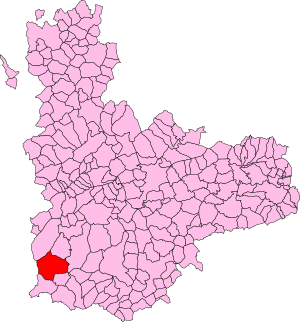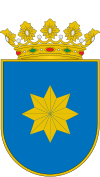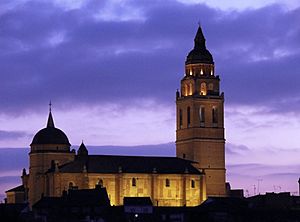Alaejos facts for kids
Quick facts for kids
Alaejos, Spain
|
|||
|---|---|---|---|
|
|||
 |
|||
| Country | Spain | ||
| Autonomous community | Castile and León | ||
| Province | Valladolid | ||
| Municipality | Alaejos | ||
| Area | |||
| • Total | 102 km2 (39 sq mi) | ||
| Elevation | 754 m (2,474 ft) | ||
| Population
(2018)
|
|||
| • Total | 1,382 | ||
| • Density | 13.55/km2 (35.09/sq mi) | ||
| Time zone | UTC+1 (CET) | ||
| • Summer (DST) | UTC+2 (CEST) | ||
Alaejos is a small town, also called a municipality. It is located in the province of Valladolid, in the Castile and León region of Spain. In 2011, about 1,467 people lived there.
Contents
History of Alaejos
The exact beginnings of Alaejos are not fully known. However, we do know it was once part of the old province of Toro. Around the 12th and 13th centuries, its name was Falafeios.
One idea is that Castilian kings might have started it. They could have founded it as a small settlement in lands they had won back. This happened during the Reconquista, a long period when Christian kingdoms took back control of Spain from Muslim rule.
Alaejos in the Middle Ages
By the middle of the 14th century, the village was sold. Diego Fernández de Medina sold it to the nearby town of Medina del Campo. Later, it became a "jurisdictional dominion." This means the Bishop of Ávila, Alfonso de Fonseca, had special legal power over the town. This arrangement lasted until the 19th century.
In the 15th century, an important event happened. Doña Juana de Portugal, who was the wife of King Enrique IV, was held in the castle of Alaejos.
Revolts and Changes
In 1520, a major uprising took place. People known as the "comuneros" rebelled against the king. During this revolt, they caused a lot of damage to Alaejos. A large part of the town was destroyed.
Later, in 1595, Alaejos became part of the Bishopric of Valladolid. A bishopric is an area managed by a bishop. Even so, the town remained part of the Province of Segovia for some time.
Modern Era and Recognition
In 1785, a special group was formed in Alaejos. It was called the Royal Economical Society of Charity. This group was inspired by the Age of Enlightenment. The Enlightenment was a time when people focused on reason and new ideas. This society started many advanced programs. They helped with economic, social, and educational activities. These programs were especially for the children and young people of Alaejos.
Because of its rich history and important buildings, Alaejos received a special title. In 1980, it was declared a "Conjunto Histórico-Artístico." This means it is a protected historical and artistic site. It's similar to being a "Heritage Preservation" area.
Fun Fact
Alaejos has an interesting geographical connection. It is the antipode of Wellington. Wellington is the capital city of New Zealand. Being antipodes means they are exactly on opposite sides of the Earth!
See also
 In Spanish: Alaejos para niños
In Spanish: Alaejos para niños
 | Aaron Henry |
 | T. R. M. Howard |
 | Jesse Jackson |




